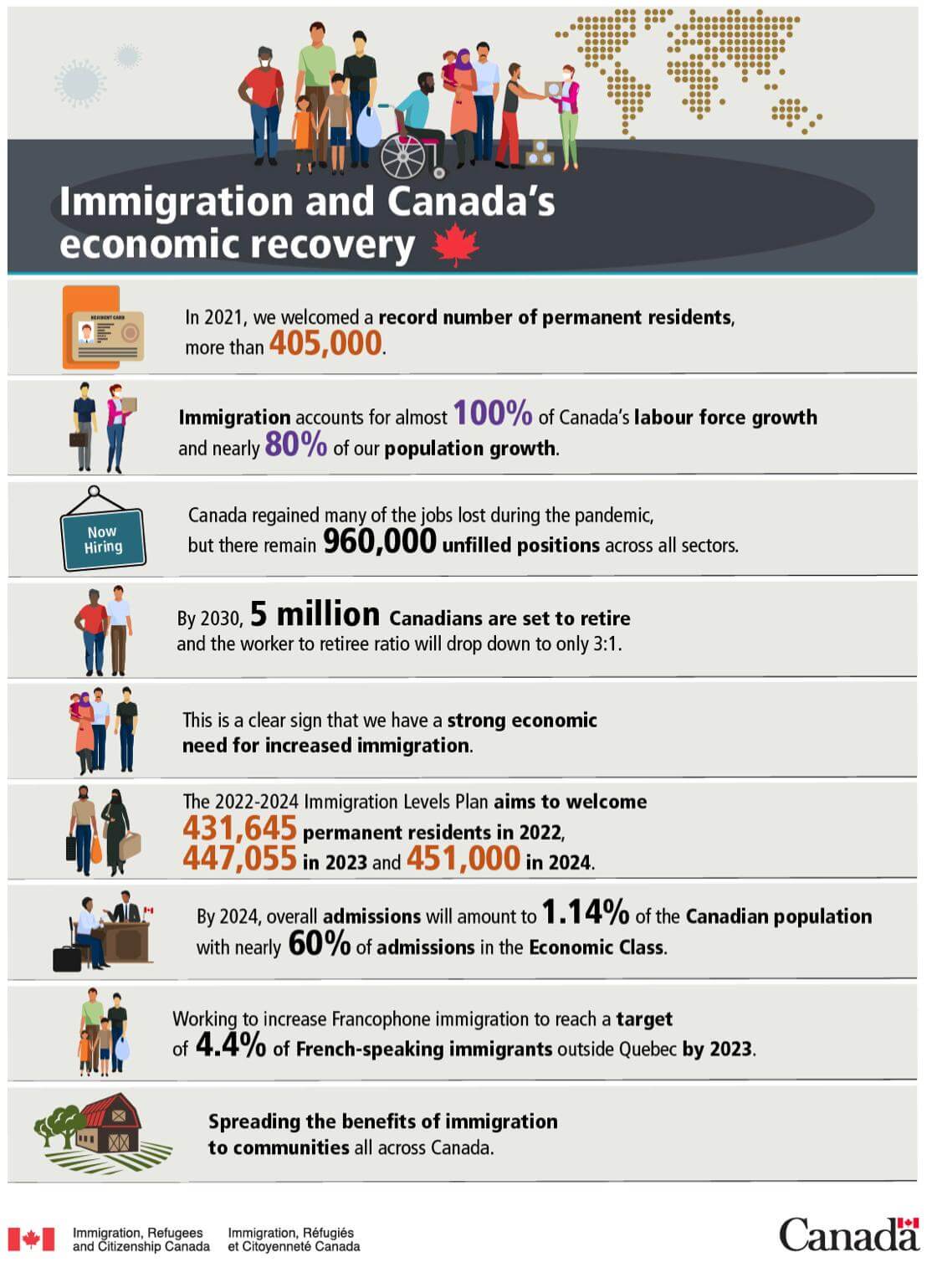
Canada marks record-breaking year for processing immigration applications
OTTAWA, ON, Dec. 19, 2022 /CNW Telbec/ – Immigration is critical to Canada’s economy and our communities, and it is a large part of our identity as Canadians. Newcomers helped build our country, were on the front lines as we battled the pandemic, and remain key to our success. Immigration, Refugees and Citizenship Canada (IRCC) has been taking steady action to strengthen Canada’s immigration system—reducing wait times, and modernizing its services so they work better for everyone.
Today, Canada’s Minister of Immigration, Refugees and Citizenship, the Honourable Sean Fraser, highlighted progress that has been made this year, in reducing backlogs of applications that have been in IRCC’s inventories beyond its service standards.
Record year for processing
Since August, IRCC has reduced its overall inventory by nearly half a million applications. The department has also been setting the bar higher and higher for processing. At the end of November, IRCC had processed approximately 4.8 million applications—nearly twice the 2.5 million processed during the same period last year.
To help strengthen our immigration system, IRCC has digitized applications, hired and trained new employees, streamlined processes, and harnessed automation technologies to increase processing efficiency while protecting the safety and security of Canadians. The department remains on track to meet its goal to process 80% of new applications within service standards for most programs and continues to make strides in improving processing, resulting in shorter wait times for our clients.
Temporary residence: bringing more visitors, students and workers to Canada
For study permit processing, Canada is on pace to set a new record this year. As of November 30 this year, IRCC had processed over 670,000 study permits, compared to more than 500,000 during the same time period last year. As a result of these efforts, most new study permits are now being processed within the 60-day service standard.
Work permit processing also saw vast improvements, with nearly 700,000 work permits processed by November 30, compared to about 223,000 during the same period in 2019, before the pandemic.
IRCC continues to reduce backlogs and process visitor visas more quickly to respond to the growing number of people who want to visit Canada. On a monthly basis, Canada is now processing more visitor visa applications than it did prior to the pandemic. In November alone, over 260,000 visitor visas were processed. By contrast, the monthly average in 2019 was about 180,000 applications.
Permanent residence: improving service and reuniting spouses and families
Canada welcomed a record-breaking 405,000 new permanent residents in 2021, surpassing the previous record from 1913. After another record year in 2022, Canada remains on track to reach its target of more than 431,000 new permanent residents.
IRCC has also been modernizing services and adding support for permanent residence programs to better serve our clients. Thanks to these efforts, all new spousal sponsorship applications are now processed within the pre-pandemic service standard of 12 months and new Express Entry applications within 6 months. Permanent residents can also expect shorter wait times when renewing their permanent resident cards as IRCC has reduced its pandemic backlog of applications for card renewals by 99%.
Citizenship
Canada is proud to have one of the highest naturalization rates in the world and encourages all newcomers to complete their journey by becoming Canadian citizens. IRCC expects a record number of new Canadian citizens in 2022–2023, with approximately 251,000 new citizens welcomed from April to November—surpassing the total number of new Canadian citizens for the last fiscal year. As a result, more than 70% of applications in the citizenship inventory are now within service standards.
Using immigration to address labour shortages
Canada embraces immigration as a strategy to help businesses find workers with the required skills in key sectors—including health care, skilled trades, manufacturing, transportation, and technology—to manage the social and economic challenges we will face in the decades ahead. The Government of Canada has been putting in place measures to help harness the full labour market potential of temporary and permanent newcomers to Canada, including:
- Extending work permits to spouses and working-age dependants of temporary foreign workers, at all skill levels. Expanding the eligibility for work permits to family members accompanying the principal applicant to Canada will help address labour shortages by assisting employers in finding the workers they need.
- Temporarily lifting the 20-hour-per-week cap on the number of hours that eligible post-secondary students are allowed to work off-campus while class is in session. With more than 640,000 international students already in Canada available to potentially work additional hours, this temporary change reflects the important role international students can play in addressing our labour needs, while continuing to pursue their studies.
- Implementing measures to allow foreign nationals whose post-graduation work permit expired or will expire between September 20, 2021, and December 31, 2022, the opportunity to work in Canada for an additional 18 months, by either extending their work permit or applying for a new one.
- Pioneering the development of economic pathways, in addition to traditional resettlement, for refugees and their families to find a safe and permanent solution. IRCC provided more funding to expand Canada’s Economic Mobility Pathways Pilot (EMPP) to more skilled refugees, and it is rolling out a new and more flexible process with trusted partners to make it easier for qualified applicants to apply.
- Shortening the wait time for those seeking asylum in Canada to obtain a work permit, from 20 months to 1 month.
- Leveraging our economic immigration programs to help bring workers to regions of Canada that need them most, including through a new permanent Atlantic Immigration Program, an expanded Rural and Northern Immigration Pilot, and a new work permit stream for Quebec-selected skilled workers.
- Exempting physicians who work in a fee-for-service model with public health authorities from current requirements. This change makes it easier for foreign-born physicians to remain in Canada so they can continue to practise in Canada and bolster our health care system.
- Announcing additional funding in Budget 2022 of $115 million over 5 years, starting in 2022–2023, and $30 million in ongoing funding to expand the Foreign Credential Recognition Program, with a focus on supporting labour market integration of skilled newcomers into the health sector.
- Implementing the National Occupational Classification 2021 for immigration programs managed under the Express Entry system. As a result, 16 additional occupations are now eligible for the programs managed under Express Entry.
- Making changes to the Immigration and Refugee Protection Act by selecting immigrants based on key attributes that support identified economic priorities, such as educational credentials, work experience or official language knowledge. Express Entry’s new category-based selection authorities are expected to be launched in the spring of 2023.
The Government of Canada will continue to provide monthly updates on our progress in reducing backlogs, as well as the steps being taken to improve client experience, reunite families and address labour shortages in Canada. We know there is still more work to do, and we are focused on building an immigration system that works well for newcomers, visitors, our businesses, and all Canadians.
Quote:
“Our government has reduced its pandemic backlogs by nearly half a million, while also processing a record-breaking number of immigration applications this year. Our actions are ensuring that we can continue to welcome and support newcomers who come to Canada to work, study, visit, or settle here. It is through the dedication and hard work of those who administer our immigration system, and our willingness to modernize and adapt, that we are able to uphold Canada’s reputation as a welcoming and inclusive country.”
– The Honourable Sean Fraser, Minister of Immigration, Refugees and Citizenship
Quick facts:
- On August 24, 2022, the Minister of Immigration, Refugees and Citizenship highlighted IRCC’s plan to strengthen Canada’s immigration system and reduce application backlogs, with a focus on addressing labour shortages, improving client experience, and reuniting families.
- To keep Canadians up to date on progress toward reducing backlogs, IRCC publishes monthly data on its website.
- Through the EMPP, partner organizations help skilled refugees overseas connect with employers who need to fill critical labour shortages. Once candidates receive a job offer, they can apply to immigrate to Canada through existing economic programs, using EMPP measures that remove barriers refugees may experience due to their displacement.
- The Atlantic Immigration Program—which became a permanent program in early 2022—is a pathway to permanent residence for skilled foreign workers and international graduates from a Canadian institution who want to work and live in 1 of Canada’s 4 Atlantic provinces. The program helps employers hire qualified candidates for jobs they have not been able to fill locally.
- The International Mobility Program Plus, launched in May 2022, is a new work permit option for Quebec-selected permanent residence candidates. With a permit from this program, an applicant who has been selected for permanent residence by Quebec, but who currently lives elsewhere, will be able to move to the province to begin working and getting settled earlier.
- The Foreign Credential Recognition Program, led by Employment and Social Development Canada, invests approximately $27.1 million annually in contribution agreements with provinces and territories, regulatory bodies and other stakeholders to help support the labour market integration of skilled newcomers. On December 5, 2022, the Government of Canada launched a call for proposals under the program for $90 million to be invested in projects that will help remove barriers preventing qualified and skilled newcomers from gaining Canadian work experience in their own profession or field of study.
Source: [canada.ca]
Image Source: https://www.freepik.com/




